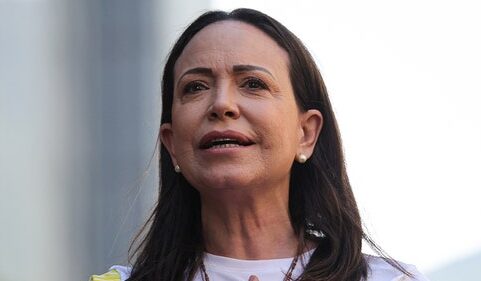The Norwegian Nobel Committee on Thursday awarded the 2025 Nobel Peace Prize to Venezuelan opposition leader María Corina Machado.
The committee recognized what it called her “tireless work promoting democratic rights for the people of Venezuela and her struggle to achieve a just and peaceful transition from dictatorship to democracy.”
The announcement was made in Oslo by Joergen Watne Frydnes, chair of the Nobel Committee, who described Machado as a “brave and committed champion of peace.”
The 58 year-old opposition leader has for years been one of the most visible critics of President Nicolás Maduro. She was barred from running in Venezuela’s 2024 presidential election, which Maduro claimed to have won though there were widespread reports of irregularities.
The vote was eventually rejected by the United States, the European Union, and several Latin American countries as neither free nor fair.
When informed of the award in a video call from the Nobel Institute, Machado appeared visibly emotional.
“Oh my God… I have no words,” she said repeatedly, before adding: “This is the achievement of a whole society. I am just one person. I certainly do not deserve this.”
Speaking from an undisclosed location in Caracas, where she has been in hiding since the disputed election, Machado said the prize was “a recognition of the courage of millions of Venezuelans who have refused to give up on democracy.”
Kristian Berg Harpviken, director of the Norwegian Nobel Institute, also became emotional as he delivered the news to Machado.
“This decision reflects our belief that peace cannot exist without freedom,” Harpviken said.
Notably, there was a significant public campaign by supporters of the U.S. President Donald Trump for him to receive the Peace Prize following his brokering of a peace agreement between Israel and Hamas earlier this year.
In July 2025, Israeli Prime Minister Benjamin Netanyahu personally handed Trump a nomination letter during a visit to Washington, calling him “a peacemaker worthy of this honor.”
“The president has already realized great opportunities. He forged the Abraham Accords and now peace between Israel and Hamas,” Netanyahu said at the time.
However, the Nobel Committee’s nomination deadline of January 31 meant Trump’s peace efforts came too late for this year’s consideration.
A spokesperson for the Committee confirmed that Trump “was not among this year’s eligible nominees,” though he could be considered for next year’s prize.
Interestingly, the White House criticized the Nobel Committee’s choice within hours of the announcement.
Steven Cheung, the president’s communications director, wrote on X (formerly Twitter):
“The Nobel Committee proved they place politics over peace. President Trump will continue making peace deals, ending wars, and saving lives. He has the heart of a humanitarian, and there will never be anyone like him who can move mountains with the sheer force of his will.”
During a Cabinet meeting later that day, President Trump declined to comment directly on the award, focusing instead on his plan to address Israel’s Knesset.
Earlier in the week, the Hostages and Missing Families Forum, a group representing victims of the October 7 attacks and their families, had sent a letter to the Nobel Committee urging recognition of Trump’s Middle East diplomacy.
“In this past year, no leader or organization has contributed more to peace around the world than President Trump,” the group wrote in the letter dated October 6.
“He has not merely spoken of peace; he has delivered it.”
Notwithstanding, news of the Machado’s win caused celebrations among Venezuela’s opposition supporters. Crowds gathered in parts of Caracas and Maracaibo, waving the national flag and chanting Machado’s name.
Henrique Capriles, a former presidential candidate, said in a phone interview that the award was “a message to the Venezuelan people that the world sees their struggle.”
Internationally, the prize drew praise from human rights groups and Western governments. The European Union’s foreign policy chief, Josep Borrell, said in a statement:
“María Corina Machado represents the peaceful resistance of millions of Venezuelans seeking a return to democracy.”
However, officials in Caracas dismissed the award as political interference. Venezuela’s Foreign Minister Yván Gil said the decision “demonstrates once again the West’s hypocrisy and obsession with undermining our sovereignty.”
Who is María Machado?
María Machado is an industrial engineer by training and entered politics in the early 2000s.
She co-founded the Súmate civic group that monitored elections under the late President Hugo Chávez. She later became a member of Venezuela’s National Assembly and a prominent figure in the opposition coalition.
Her advocacy for nonviolent protest and transparent elections has made her both a target of government repression and a symbol of democracy.
According to Human Rights Watch, more than 280 political prisoners remain detained in Venezuela, and the country’s inflation rate, which once exceeded 300%, continues to fuel mass emigration.
The 2025 Nobel Peace Prize will be formally presented in Oslo on December 10, the anniversary of Alfred Nobel’s death.
Machado said she hopes to attend the ceremony if security conditions allow.
“I want to dedicate this award to every Venezuelan who believes that peace and democracy can still be achieved,” she said.
The Nobel Committee concluded its statement by stating that the award was meant to show “the essential link between democracy, human dignity, and peace.”



